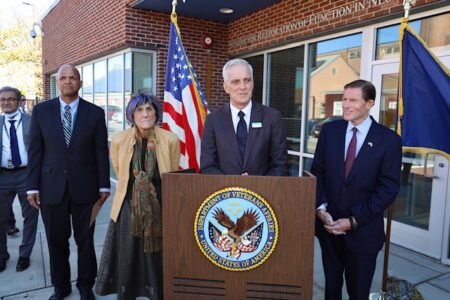By Peggy McCarthy
RECOMMEND TWEET EMAIL PRINT MORE
Up to 10,000 Connecticut veterans who haven’t been eligible for Veterans Affairs (VA) benefits will now qualify for them if they have medical conditions resulting from exposure to burn pits or toxic contaminants, U. S. VA Secretary Denis McDonough said Wednesday.
He was speaking at a news conference after meeting with staff, veterans and their caregivers at VA Connecticut Healthcare in West Haven.
The added eligibility is the result of a new federal law, called the PACT Act, which provides an easier path to compensation and care for illnesses that occur after exposure to burn pits and other environmental toxins. It expands the number of veterans eligible nationally for such help by about 300,000, according to the VA.
There are now about 56,000 Connecticut veterans enrolled at the VA, according to Pamela Redmond, spokesperson.
On Nov. 8, the VA will begin screening all of its patients across the country to learn about such exposures and resultant illnesses “to help us understand the size of the challenge we face,” McDonough said.

West Haven VA Photo.
VA Secretary Denis McDonough discusses the new federal law, the PACT Act and urged veterans to apply for benefits, during a visit at the West Haven VA on Wednesday. With McDonough is (from left) Acting Director of VA Connecticut Healthcare Russell Armstead, U.S. Rep. Rosa DeLauro and U.S. Sen. Richard Blumenthal.
He said of more than 13,000 veterans screened in a national pilot program, 37% said they believed they were exposed to toxic materials while in the military. “That tells you something about the unmet needs of veterans,” he said.
He urged Connecticut veterans with exposure-related medical problems to seek care and benefits from the VA, now that the new law is in effect. “Those veterans here in Connecticut who believe they are suffering a condition related to toxic exposure, come here to the VA and we will take care of you,” McDonough said. He said they can get information by going to VA.gov/PACT or calling 1-800-MYVA411 (1-800-648-2411).
The added anticipated caseload will require additional staff in Connecticut, including medical providers, he said. According to Redmond, it hasn’t yet been determined, how many people will be needed. The VA now employs 4,195 people in the state, she said.
Members of Connecticut’s Congressional delegation accompanied McDonough in his West Haven visit, which was closed to the press. A news conference took place afterward.
U.S. Rep. Rosa DeLauro, a Democrat, who represents the Third District, said, “we have a moral responsibility to do the right thing” for veterans made ill by toxic exposures.
U.S. Sen. Richard Blumenthal, a Democrat, praised the new law, but said it is too late for those who died before it was passed. He expressed hope that if veterans tell of their exposures during the upcoming medical screenings, cancers could possibly be caught “early, before they become more serious.”
Blumenthal, a member of the Senate Armed Services Committee, referred to the late Peter Antioho, an Army veteran from Berlin, who died of brain cancer after exposure to burn pits in Afghanistan. Blumenthal said he promised Antioho that he would try to prevent other veterans from having to go through what he did to get disability benefits.
Antioho, who died at 34, and his wife, Amy, spent a year applying for VA benefits in connection with his glioblastoma. C-HIT wrote about Antioho’s plight for VA benefits in 2019.
The VA rejected his application twice before the VA ultimately granted benefits after Blumenthal and U.S. Rep. John Larson, First District Democrat, intervened. Blumenthal said Antioho told him that “I shouldn’t have to go to a U. S. Senator to get benefits.”
Idervan DaCosta, of Brookfield, is in the process of appealing a rejection of his application for disability benefits related to burn pit exposure in Afghanistan. “It’s very frustrating,” he said. “I applied for some of these benefits when I was discharged as I was already developing symptoms in 2013,” he said. He submitted an appeal in September. His symptoms include shortness of breath and a fiery pain in his lungs, he said.
In 2020, the VA reported to Congress that 80% of applications for burn pit-related illnesses were denied to veterans who served in Iraq, Afghanistan and the Persian Gulf. Only 20% of more than 12,000 applications were approved between 2007 and 2020, the VA reported.
The new law, expected to cost more than $300 billion over the next decade, adds 23 illnesses that the VA will automatically presume are the result of toxic exposures in the military, meaning that veterans won’t have to prove a service connection in their quests for benefits.
In addition to veterans who served in Iraq, Afghanistan and the Persian Gulf, it also adds veterans who served in Thailand, Guam and five other locations during the Vietnam War as presumed locations for Agent Orange exposure and includes hypertension as a service-connected illness from Agent Orange. It also provides benefits to families exposed to toxic water at the Camp Lejeune Marine Base in North Carolina and veterans exposed to carcinogens in Uzbekistan and radiation at a 1966 B-52 crash in Palomares, Spain.
McDonough was also scheduled to visit staff at the VA in Newington to discuss disability benefits for veterans exposed to toxins while in the military.
SUPPORT OUR WORK
The Conn. Health I-Team is dedicated to producing original, responsible, in-depth journalism on key issues of health and safety that affect our readers, and helping them make informed health care choices. As a nonprofit, we rely on donations to help fund our work. Donate Now


